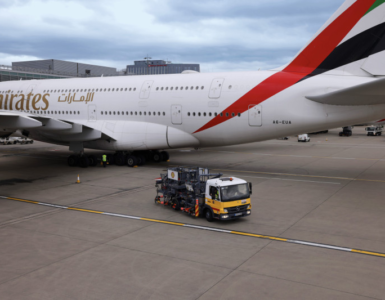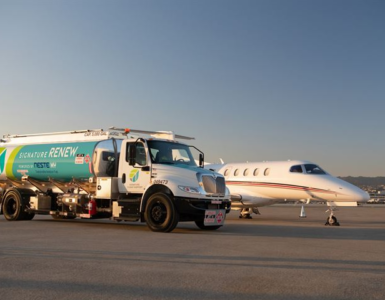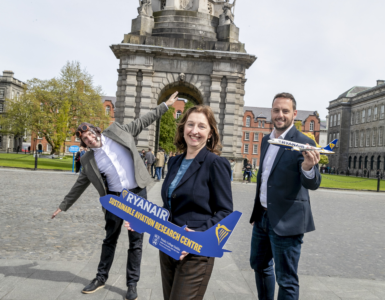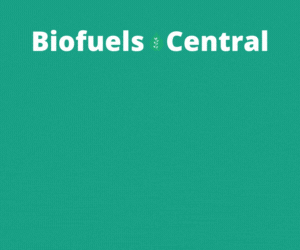Dutch-Swedish consortium to continue study on production of Sustainable Aviation Fuel from forestry residues in Sweden – KLM & Swedish Energy Agency.
The Swedish Energy Agency announced it will grant funds to KLM Royal Dutch Airlines, Södra, Växjö Energi, SkyNRG, RISE Research Institutes of Sweden and 2030-sekretariatet to continue their research on the development of production of Sustainable Aviation Fuel (SAF) in the Växjö region in Småland, Sweden.
The funding will support the consortium to continue their study on an integrated Fischer-Tropsch SAF production facility using forestry residues. The envisioned facility has the potential to be an important step forward in making aviation more sustainable. The Swedish Energy Agency awards the consortium with a grant of 5.1 million SEK (+/-EUR 500.000) to fund the project.
This first-of-its-kind Fischer-Tropsch SAF production facility integrated with existing bio-based energy production has the potential to produce high quality sustainable fuels and reduce GHG emissions in the aviation sector.
🔥 What about we co-host a webinar? Let's educate, captivate, and convert the biofuels economy!
Biofuels Central is the global go-to online magazine for the biofuel market, we can help you host impactful webinars that become a global reference on your topic and are an evergreen source of leads. Click here to request more details
The realisation of the plant could serve as a proof of concept for many future plants. By 2026, the plant could be operational with a production volume of 16 kilo tonnes SAF annually.
Dutch-Swedish consortium covering the whole value chain
The consortium, which represents the whole value chain of the production, joins forces in order to increase the availability of SAF in Sweden and North Europe. To meet future demand partners will research all engineering, technical, business and sustainability angles of the project.
NGOs, the Swedish government, Södra, certification systems, academics and SkyNRG’s Sustainability Board are being involved to set the right sustainability framework for this project. Sustainability factors considered in the study include the carbon balance and the biodiversity of the forest as well as potential displacement effects of utilising forestry residues for SAF production.
SAF not widely available
The current generation of aircraft engines require liquid fuels. These aircraft cannot switch to alternative energy sources such as hydrogen or electricity in the short term, and neither can airport infrastructure. SAF, as a ‘drop-in fuel’ is the solution to drastically reduce CO2 emissions in aviation in the short to medium term, with no modifications to infrastructure or equipment required.
SAF is not widely available yet. It has the potential to reduce carbon emissions by 75 to almost 100 percent in its neat form, depending on the combination of technology pathway and feedstock, and as long as stringent sustainability criteria are met.
KLM Royal Dutch Airlines: focus on alternative technologies
Karel Bockstael, VP Sustainability at KLM, an ambitious and pioneering airline in making the operation and the aviation sector more sustainable:
To be able to become more sustainable in the future, KLM is focusing on scaling up production and use of SAF.
“For more SAF, we must focus on all technologies side by side and encourage the initial upscaling of production facilities. The application we support in Sweden is an important next step in the development. Current technologies based on used cooking oils will reach its limit due to scarcity, and the development of sustainable synthetic SAF has financial and technological challenges to overcome.”
“The technology we will be deploying in Sweden is based on Fischer-Tropsch synthesis, and produces jet fuel based on forestry residues. There is a lot of this residue available in Sweden and the rest of Europe, making it a promising project.”
Södra: small-scale family forestry of 53,000 forest owners
Lotta Lyrå, President and CEO of Södra, an international forest industry group and the largest forest-owner association in Sweden with a membership of 53,000 forest owners:
Södra is devoted to maximize the use of every tree that comes from our 53,000 member’s forests in Southern Sweden.
“Using every part – like residues – is key in our ambition to show the way to a fossil-free society and contribute to the climate transition. Making high quality Sustainable Aviation Fuel from forest residues not suitable for buildings or other materials is a way of doing so and help de-carbonize aviation.”
“With this consortium, we are working through the entire value chain to take the next step towards creating a new industry of Sustainable Aviation Fuel.”
Växjö, greenest City in Europe
Erik Tellgren, CEO of Växjö Energi, provider of products and services in the areas of electricity, district heating and district cooling in Växjö Municipality, Sweden:
Växjö Energi provides efficiently produced fossil free district heating, district cooling and electricity at the CHP plant Sandviksverket in Växjö Municipality, Sweden.
“Växjö, the Greenest City in Europe, has a strong will to continue contributing to reducing climate change. We also trust it is beneficial to extend our plant to also produce sustainable aviation fuel from forest residues. This would be great and as a first-of-a-kind project of vital importance to the sustainable energy transition necessary.”
SkyNRG, SAF frontrunner
Maarten van Dijk, Managing Director of SkyNRG, pioneer in SAF with the industry’s biggest dedicated SAF team:
As one of the global market leaders in Sustainable Aviation Fuel we are active partners in a multitude of projects, focused on scaling different feedstock/technology pathways.
“The potential to use forestry residues for higher value end-uses, like SAF, is there. But before taking a next step in scaling up, it is critical to make sure we understand the sustainability and impacts of this new, integrated supply chain. We are therefore very grateful for the strong partnership and financial support from the Swedish government to take a next big step in understanding the true potential of this feedstock/technology setup.”
Dutch-Swedish consortium gets go ahead to continue study on production of Sustainable Aviation Fuel from forestry residues in Sweden, June 17, 2021








